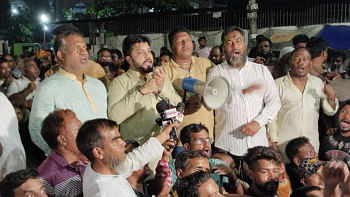Immortality through music

Clockwise (from top): Feroza Begum, Mohammad Asafuddowla and Shakila Zafar render Kamol Dasgupta classics at the programme. Photo Courtesy: Snigdha Zaman
A show that starts around 40-minute late, has already dampened the mood. Picking up from there, and not only appeasing the audience but also leaving them wanting more, is a Herculean task. Kamol Dasgupta birth centenary celebration at Bangladesh Shilpakala Academy in Dhaka, on May 12, did just that. The event was arranged by Kamol Dasgupta Foundation and sponsored by ACI Limited; ETV was the media partner.
For those who are not familiar with Kamol Dasgupta, he was the Kaalboishakhi who created a bold identity in the sphere of Bangla music during the Rabindra-Nazrul hangover (1930s and '40s). Dasgupta not only managed to dominate the contemporary Bangla music scene, but also made a breakthrough as an uber-popular composer of Urdu/Hindi geet and ghazal.
Still lost? Surely, you've heard or hummed “Ami Bonophool Go”, or “Toofan Mail”, or “Prithibi Amare Chaye”, or “Du'ti Pakhi Du'ti Teerey”; all Dasgupta creations.
Speaking on Dasgupta, music exponent Mohammad Asafuddowla said, “Dasgupta had composed tunes of 8,500 songs, of which 400 were written by National Poet Kazi Nazrul Islam. Nazrul and Dasgupta were disciples of the same music teacher, Ustad Zamiruddin Khan. Nazrul had such blind faith on Dasgupta's abilities that he gave the composer wholehearted consent to create the melodies of his songs that haven't been tuned yet.”
Reminiscing further, Asafuddowla said, “I once asked him: 'The raag used in your compositions can't be detected. Why?' His response was: 'Composing a song based on a certain raag is easy, but an ideal song demands its own identity.'
“Besides composition, Dasgupta's contribution to music came in other areas also. He devised a shorthand method for writing shorolipi (notations); sadly the practice stopped with his demise.
“Under Dasgupta's able supervision artistes who went on to become legends, such as Juthika Roy, Jaganmay Mitra, Hemanta Mukherjee, Talat Mahmood, and of course Feroza Begum (Dasgupta's wife), blossomed.”
Asafuddowla said that it was regrettable that an artiste-musician-composer of Dasgupta's stature is not being celebrated nationally by the state and not much has been done to preserve and promote his work.
A musical homage was the highlight of the event. A-list singers, under Shujeo Shyam's competent direction and accompanied by a brilliant orchestra, resurrected Dasgupta's classic tunes.
Seasoned artiste Syed Abdul Hadi started off the music session with “Tumi Ki Ekhon Dekhichho Shopon” and “Prithibi Amare Chaye”.
After a rather slow start, Shakila Zafar's vivacious renditions of “Ami Bonophool Go” and “Toofan Mail” (made famous by the inimitable Kanan Debi) picked up the pace.
Fatema Tuj Zohra seemed to have forgotten the lyrics of “Jibon-er Du'ti Raati”, but that created an impromptu duet between her and Shafin Ahmed (Dasgupta's son). Zohra also presented a memorable cover of “E Bhora Badol-e Hiya Doley Re”.
Shafin Ahmed, better known as one of the founder members of Miles, paid tribute to his father with his covers of “Konthhe Amar Nishidin” and “Eshechhilo Modhujamini.”
Asafuddowla brought to stage Dasgupta's ghazal and Urdu geet -- “Ghum-er Chhaya” and “Tasveer Teri Dil Mera Behla Na Sakegi” (originally recorded by Talat Mahmood).
Ferdous Ara breathed life into “Bhuli Nai Bhuli Nai.”
Rounds of applause greeted Sabina Yasmin who conjured a nostalgia-induced monsoon ambiance with “Emoni Borosha Chhilo Shedin”.
Subir Nandi sang the ever-familiar “Du'ti Pakhi Du'ti Teerey” and “Menechhi Go Haar Menechhi” -- the latter, a submission to love's all-conquering force.
The best was, without a doubt, saved for last, as the octogenarian songstress Feroza Begum took the stage. She needed help to get on the stage, but proved her vocal abilities were anything but feeble through immaculate renditions of “Shotek Borosh-o Porey Tumi Aar Ami” and an apt closing note, “Ei Ki Go Shesh Daan”.
Though the common grievance is that Dasgupta's memories have not been given proper reverence, at that moment I reckoned, the legendary composer would survive another 100 years or as long as anyone -- knowingly or unknowingly -- hums his tunes.

 For all latest news, follow The Daily Star's Google News channel.
For all latest news, follow The Daily Star's Google News channel. 



Comments